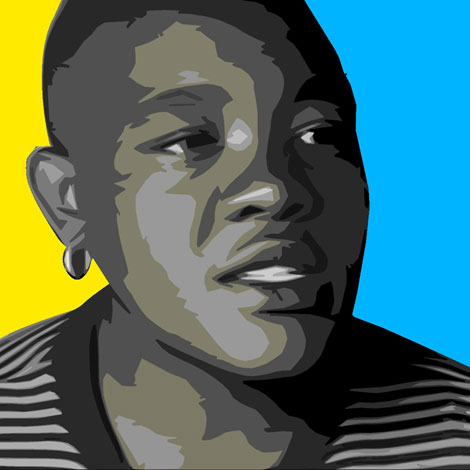In the early hours of 24 April 2011, Noxolo Nogwaza, a 24-year-old woman human rights defender from South Africa, was murdered on her way home from a night out with friends. Her attackers raped and repeatedly beat her – because of her sexual orientation as a lesbian woman – before dumping her body in a drainage ditch.
As is often the case with women human rights defenders, Noxolo was targeted for both who she was and what she did. Noxolo campaigned for the rights to equality and dignity for lesbian, gay, bisexual, transgender and intersex (LGBTI) individuals through her membership of the Ekurhuleni Pride Organising Committee (EPOC) – a community-based organisation aiming to empower and inform LGBTI people and to combat hate crimes, victimisation and injustice through education and awareness-raising activities.
As an activist for LGBTI rights, Noxolo was aware of the risks of living openly as a lesbian woman. She lived and died in KwaThema, a township east of Johannesburg. This same township saw its first high profile killing of an openly lesbian woman in 2008, Eudy Simelane, who at the time was a team member for South African Women’s National Football team. Homophobia and hate crimes against LGBTI individuals are common in South Africa, particularly against those living in townships and rural areas, and also occur within a wider context of persistent, high levels of violence against women. However, Noxolo did not allow this relentless environment of fear to stop her from living her life.
Described by her aunt (who was also her best friend) as a soccer fanatic, Noxolo played street soccer and the backroom she shared with her daughter was covered in posters of her favourite local soccer team. Although Noxolo never finished her schooling, she was an avid reader and was described by her friends as “always having some kind of reading material in her nose”. A mother of two, Noxolo did the best she could to provide for her children despite being unable to obtain stable and well paid employment.
Although most people described her as quiet and shy, Noxolo was a «fighter» and always stood up for her rights and for whatever she believed in. She is described by her EPOC colleagues as hard working and reliable, if not very talkative, Noxolo spoke through her actions.
Investigation
Since the time of her murder it appears that critical investigation steps were not taken by the police, missing the opportunity to gather vital evidence.
In late 2012, the family were informed by the police that they had referred the case to the Office of the Director of Public Prosecutions for a decision. In March 2013, the family were informed that an ‘informal’ inquest would be held in April 2013 in the local magistrate’s court. This is a limited inquest inquiry procedure, and as such, would leave the family and Noxolo’s supporters with many questions unanswered and little justice.
In May 2011, in response to a change.org petition about targeted rape of lesbian women, the department of justice and constitutional development set up a national task team – including government representatives, the police and civil society – to look into gender-based violence affecting LGBTI people. In 2013, a sub-group of the national task team was created: the rapid response team. Part of its remit is to follow-up on and oversee the resolution of 43 uncompleted cases of targeted violence against LGBTI people. Noxolo’s case is on the list. By mid-2014, 19 of these cases had been finalised – but not Noxolo’s.
No further progress has been made in investigating the case and bringing the perpetrators to justice. Her killers remain at large. This failure increases the impact, for those who knew her, of the terrible acts of violence and hate which led to her death. This situation of impunity also places others at risk of harassment, discrimination and hate-motivated violence on the grounds of their real or perceived sexual orientation or gender identity; or because of their activism in defence of their right to equality and dignity.


